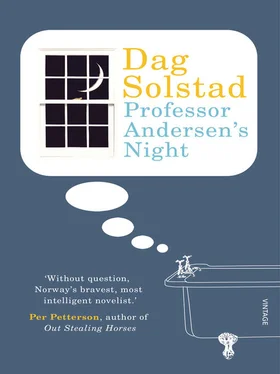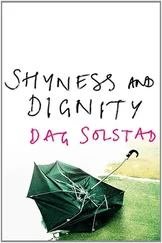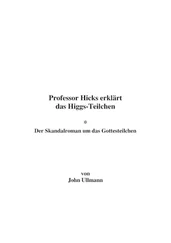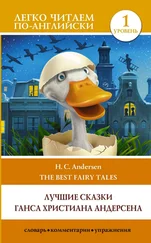Dag Solstad - Professor Andersen's Night
Здесь есть возможность читать онлайн «Dag Solstad - Professor Andersen's Night» весь текст электронной книги совершенно бесплатно (целиком полную версию без сокращений). В некоторых случаях можно слушать аудио, скачать через торрент в формате fb2 и присутствует краткое содержание. Год выпуска: 2011, Издательство: Harvill Secker, Жанр: Современная проза, на английском языке. Описание произведения, (предисловие) а так же отзывы посетителей доступны на портале библиотеки ЛибКат.
- Название:Professor Andersen's Night
- Автор:
- Издательство:Harvill Secker
- Жанр:
- Год:2011
- ISBN:нет данных
- Рейтинг книги:3 / 5. Голосов: 1
-
Избранное:Добавить в избранное
- Отзывы:
-
Ваша оценка:
- 60
- 1
- 2
- 3
- 4
- 5
Professor Andersen's Night: краткое содержание, описание и аннотация
Предлагаем к чтению аннотацию, описание, краткое содержание или предисловие (зависит от того, что написал сам автор книги «Professor Andersen's Night»). Если вы не нашли необходимую информацию о книге — напишите в комментариях, мы постараемся отыскать её.
Professor Andersen fails to report the crime. The days pass, and he becomes paralysed by indecision. Desperate for respite, the professor sets off to a local sushi bar, only to find himself face to face with the murderer.
Professor Andersen's Night
Professor Andersen's Night — читать онлайн бесплатно полную книгу (весь текст) целиком
Ниже представлен текст книги, разбитый по страницам. Система сохранения места последней прочитанной страницы, позволяет с удобством читать онлайн бесплатно книгу «Professor Andersen's Night», без необходимости каждый раз заново искать на чём Вы остановились. Поставьте закладку, и сможете в любой момент перейти на страницу, на которой закончили чтение.
Интервал:
Закладка:
The other guests arrived. They were all acquaintances of Professor Andersen. There was the actor Jan Brynhildsen, who had become a marvellous interpreter of comic roles at the National Theatre, and his second wife, the somewhat faded air hostess Judith Berg, and there was the senior psychologist Per Ekeberg and his partner Trine Napstad, the top civil-service administrator in the Ministry of Culture. All the guests were in their fifties like their hosts Nina and Bernt Halvorsen, and had known each other for years. Professor Andersen was glad Nina and Bernt hadn’t invited an additional female guest, who would have been his table companion, as he thought it much easier to relate to social occasions without having imposed on him the duty of entertaining a single woman, who, in advance, one had to assume, had looked forward to an eventful evening, and whose expectations he therefore would have had to do his utmost not to disappoint. He felt much freer as a single guest without a single woman accompanying him at the table, it also made him wittier, because then he could throw himself into the role of being an affable participant in the party as a whole, instead of having to be a tense, though gallant, cavalier.
They sat down at the dinner table. The seating arrangement had been fixed elegantly and with an experienced hand so that their being an odd number went unnoticed, but gave them an added sense of well being, since Nina, their hostess, had two companions at the table, Jan Brynhildsen, sitting on her left, and Per Ekeberg on her right, both of whom could then cheerfully compete to win her favour and attention, while Bernt, their host, had one female companion, Judith Berg, on his left, who for her part could enjoy this, while at the same time she had Per Ekeberg on her left. Trine Napstad could likewise enjoy having Professor Andersen as a table companion, but she also had Jan Brynhildsen, the comedy actor with leading roles at the National Theatre, on her right side, and he could converse with her if, or rather when, their hostess Nina was deep in conversation with Per Ekeberg sitting on her right, and in that way was able to relieve Professor Andersen, who then could take the opportunity to exchange a few words with his old friend Bernt Halvorsen, the host, whom he had sitting on his left, or just to stare vacantly into space, if the latter was deep in conversation with Judith Berg, his table companion. In this manner the conversation could flow easily from one to the other, with plenty of opportunity for all of them to get involved in one single topic, if most found it sufficiently interesting, because the responsibility of having a fixed female table companion hadn’t been laid on anyone, apart from Bernt, but since he was the only one, a clear responsibility rested on him to ensure that the whole table was engaged in conversation, and preferably the same one at that, and thus it was evident yet again that on social occasions it is an advantage, and not a drawback, to have an odd number, thought Professor Andersen, and therefore it is so peculiar that those who take it upon themselves to invite people to a party worry time and again very much about inviting couples; remarkable, thought Professor Andersen, who could scarcely recall the last time he had been at a successful dinner party with an even number seated round the table.
They had rakfisk as a starter and the main course was grouse. Beer and a chaser of aquavit were served with the rakfisk; a Spanish red wine, a good Rioja, with the grouse. Before the starter was served, Nina their hostess complained of an irresolvable problem which they had encountered while drawing up the menu. Rakfisk as a starter, and grouse afterwards, they go together, not least if one considers that both the rakfisk and the grouse come from the same geographical area, Valdres. But as for the beverages, beer and a chaser of aquavit first, followed by red wine — Nina didn’t think that was an ideal combination, but what else could they have done? Thought of a different starter before the grouse? No, she didn’t want to do that, she said, when one has rakfisk in one’s larder from Valdres, and grouse from the same area, both of them obtained in a personal way, considering that Bernt had shot the grouse, right there in Valdres, and the rakfisk was procured by one of their close acquaintances in Valdres, so it had to be done like this, ‘And so you will just have to put up with drinking beer and a chaser with the rakfisk now, and going over to red wine later,’ said Nina decidedly.
They ate rakfisk. They skolled with beer and aquavit. Professor Andersen was at a Christmas dinner party at his good friends’ Nina and Bernt Halvorsen. Bernt he had known ever since his youth, and they had grown up together in a town somewhere near the Oslo Fjord. They had come to Oslo to study at the same time, Bernt medicine and he the arts and humanities, and they had remained close throughout their student days, despite belonging to different faculties. After a while Bernt found his Nina, who also studied medicine, and Professor Andersen had got to know her too. He had found a wife who also studied the arts and humanities, and from the end of their student days the two newly married couples had spent much time together. They had continued to see each other often, with intervals when one or other of the couples had been living outside Oslo — Nina and Bernt because they worked at a hospital out of town, he because he was abroad, either on a research grant or as a Norwegian visiting professor in Strasbourg, right up until he got divorced ten years ago, and then he had continued to see Nina and Bernt on his own. Both he and Bernt had been successful in life, he had secured a post at the university early on, had done a PhD and become a professor while still relatively young, at the same time as Bernt had made a career for himself in the hospital sector, where as a young man he had become a consultant, a position he held today at Ullevål Hospital.
The other guests were Nina and Bernt’s friends, but for that reason they had also become close acquaintances of Professor Andersen. Per Ekeberg he remembered well, as a psychology student from the early Sixties, and also Trine Napstad he remembered from the dozy reading rooms at Blindern, where she, like him, had studied the arts and humanities. Small and animated, she had talked non-stop in a far-too-loud, piercing voice the moment she escaped the silence of the reading room. That had grated on his nerves somewhat, he remembered, even though he had thought she was attractive enough. When he had met her again, at Nina and Bernt’s, as Per Ekeberg’s new partner, and thus, in reality, his second wife, he on occasion found himself wondering about Per Ekeberg’s first wife, since Per had settled down, found solace, with this woman on his journey through life, which also for him, Per Ekeberg, has an unavoidable conclusion, as we all know, and which, at least for brief periods of time, cannot fail to cause us concern. Per Ekeberg was a senior psychologist. It was a title he took with him when he moved from the public sector into private enterprise to be a director in the Norwegian branch of an international advertising agency. He appeared to be just as content in the private sector as he had been in the public one, and in addition he earned a lot more money, and it’s possible he also set greater store by the creative side of his new profession, which, among other things, was such that he didn’t need to call himself Director, but could continue to present himself as senior psychologist, which undoubtedly seemed more intriguing when the title was used in an advertising context.
If he were to choose, then he had greater respect for Jan Brynhildsen and Judith Berg than Per Ekeberg and Trine Napstad. Jan Brynhildsen had, as a newly divorced 45-year-old (after being married to a female colleague who at that time was far more successful than he was), fallen head over heels in love with an air hostess. A rather weary-looking beauty in her forties, who was a single mother with a teenage daughter from a short-lived affair with an Italian business magnate. Jan Brynhildsen was at the time a typical second-rate actor and his falling in love with a faded air hostess undeniably had a strong element of comedy to it, of the more malicious kind that Professor Andersen, for his part, couldn’t claim to be entirely innocent of being partial to. But in this amorous project Professor Andersen had been Jan Brynhildsen’s secret admirer. He had looked up to him, and inwardly urged him on, Jan Brynhildsen, the walk-on actor at the National Theatre, to follow the convictions of his heart. ‘The person who is unable to be fascinated by his youthful dream of the Air Hostess has lost the ability to love,’ he inwardly urged, ‘even if she, Judith Berg, doesn’t resemble the dream of the Air Hostess, but is a tired, middle-aged woman with a bad back and swollen feet and bitter wrinkles round her painted mouth, she nevertheless represents the Air Hostess, for whom we just have to fall, Jan Brynhildsen and I,’ thought Professor Andersen, then as now. ‘Jan Brynhildsen is ingenuous in his love, and for that I admire him, and he will surely be rewarded,’ Professor Andersen had thought. And he had been rewarded. On stage. On the main stage at the National Theatre. That was where he now had his success. First in small roles, which all of a sudden were played with a comic talent that aroused interest among theatregoers. Very minor roles from the pens of great playwrights often have great comic potential which is seldom exploited, either because minor roles are played by minor actors or, if they are given to good actors, they can easily overshadow major roles and more important scenic events, and thus damage the dramatic unity of the piece. But Jan Brynhildsen succeeded, and that was because he didn’t play the comic parts like a great actor, but like a minor one. He stood there in his minor role, completely devoid of dreams and ambitions. He didn’t try to show the comic nature inherent in the character by stealing the scene. He stood there on the fringe, playing the minor role as a minor actor, but with luminous, raw, indeed hoarse, comedy, which many in the audience experienced as a magic moment of silence and laughter. Soon he was getting larger comic roles, and now he was one of the theatre’s leading comic talents, who came to mind for a main part every time the theatre was to stage Molière, Holberg or a light comedy by Shakespeare. But although he gave a good performance in these classic comic roles — not least by continuing to preserve the minor actor in the garb of the leading role — it was the sweet (in the original meaning of the word) element of the character that was really touching, and one ought to be touched when seeing a comedy performed, but it was nevertheless Professor Andersen’s opinion that it was in the minor parts that Jan Brynhildsen had carried out remarkable feats, and there were many people who were of the same opinion, even if this wasn’t expressed publicly or privately by Professor Andersen, because he didn’t want to hurt Jan Brynhildsen, even though Jan Brynhildsen himself wouldn’t have heard what he said.
Читать дальшеИнтервал:
Закладка:
Похожие книги на «Professor Andersen's Night»
Представляем Вашему вниманию похожие книги на «Professor Andersen's Night» списком для выбора. Мы отобрали схожую по названию и смыслу литературу в надежде предоставить читателям больше вариантов отыскать новые, интересные, ещё непрочитанные произведения.
Обсуждение, отзывы о книге «Professor Andersen's Night» и просто собственные мнения читателей. Оставьте ваши комментарии, напишите, что Вы думаете о произведении, его смысле или главных героях. Укажите что конкретно понравилось, а что нет, и почему Вы так считаете.












